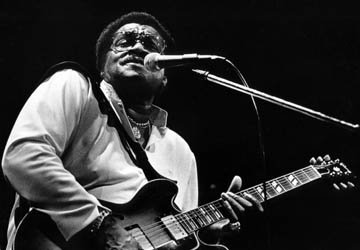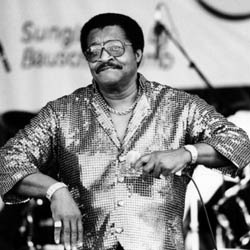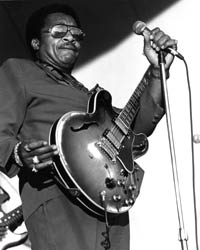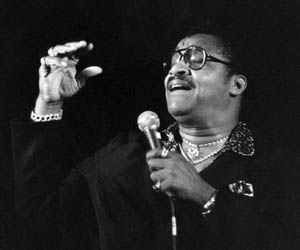 |
 |
|
|||||||||||||||||||||||||||||||||||||||||||||||||||||||||||||
| Open the Door and "Welcome LITTLE MILTON"! | |||||||||||||||||||||||||||||||||||||||||||||||||||||||||||||||
guest stars
join
by
Jeff Weiner and |
|||||||||||||||||||||||||||||||||||||||||||||||||||||||||||||||
|
"Hey! Hey! The Blues Is Alright!" Little Milton Campbellís proud signature tune is heartily sung by local, national and international blues bands each night in every corner of the globe. Unofficially dubbed the "International Blues Anthem," most musicians live to write a song ingrained so deeply into the American blues fabric as is "The Blues Is Alright." It resonates with people worldwide, even though the majority of fans who shout out the call-and-response chorus, as well as some of the local bands who play it nightly, may not realize theyíre covering Little Milton, one of the true consummate professionals of the blues. After an almost five-decade career, the 65-year-old singer/guitarist consistently delivers a unique blend of B.B. Kingís melodically stinging guitar fused with Bobby "Blue" Blandís raspy yet sexy gospel vocals. Miltonís magnetic performing style was molded by his early association with Sonny Boy Williamson (Rice Miller) and the original King Biscuit Boys. Yet, for all the acclaim and recognition heís received as an internationally renowned bluesman for the past quarter century, Milton still hasnít achieved the level of mainstream popularity he so rightly deserves. But itís possible that Little Miltonís 13th album for Malaco Records, Welcome to Little Milton, may well be his long-sought vehicle to crossover success. Welcome to Little Milton is the brainchild of producer Greg Preston. In an effort to broaden Miltonís fan base, Greg leveraged the friendship and mutual trust he enjoys with Little Milton to hand-pick headliners from diverse musical backgrounds to lend their marquee names to the project. Some, like Kebí Moí, Susan Tedeschi and Delbert McClinton are already well known to the blues world. Govít Mule, Lucinda Williams, Peter Wolf, G. Love & Special Sauce and Dave Alvin are recognized by a wider spectrum of music fans. Each inspired by his unique brand of soul-blues, together they share much love and respect for Little Milton, and the resulting album finds a clearly invigorated Milton having a blast sharing the spotlight with his guest artists.
"I was pleasantly surprised," Milton told us. "Each one of these artists came into this project without that super-stardom attitude. They were down to earth and looking up to me in a sense. But it went so smoothly, the transition was just like the right-sized fingers going into a glove. It was a universal language and also a universal attitude. Within a few minutes, it was as if we had known each other for years and we had done this thing several times before. It was beautiful." The songs range from the pained country standard "Love Hurts" (sung with Lucinda Williams) to the rollicking "Gimme My Broom" (featuring Kebí Moí on vocals and guitar) to the raging blues-rock of "When the Blues Come Knockiní" (with Govít Mule providing a hard kick). Yet throughout the program Milton remains confidently in control despite the eclectic nature of the material. "Each artist brought something great to this project. I did my best to accept it, put my little bit in, and fortunately everybody came out with their own identity. It was a togetherness thing and it was enjoyable. "I am the type of artist who will not record anything that I cannot feel, or anything I canít add something to and at the same time get something out of. When you do that, if youíre able to pull it off, youíre not only cheating the potential record buyers, but youíre cheating yourself. Every tune I did I enjoyed and felt it could be a potential winner, and a number one tune. "I not only did that when I went into the studio with these people, but I do that with all of my recording sessions. I donít record nothing that I donít feel, that I donít like. I donít give a damn who writes it or who says you should do it. "When I go into the studio, I am my own boss. I have advisors and friends, I listen to them and I listen to their points. But if I feel that I canít do it without putting all of me into it, then I say, ĎNo, we are not going to do it.í" Listening to Little Milton, we were struck by his deep respect for his elders and the values they instilled in him. Describing the mural depicting several seminal local blues legends now on display near the levee in downtown Helena, Milton beams: "I literally bowed to what I saw. There could not be any greater contribution and respect given to these great human beings, these great entertainers, these pioneers of what we call the blues today, than going back and paying homage to Mount Rushmore. These were the pioneers. I learned so much from these guys."
"The stars are the people sitting out there in the audience," Milton adds. "The people that go to the record stores, buy your product and pay their money to see you ó those are the stars. You are just a tool to give some humor, some pleasure, some sadness, because your songs make them happy about good things that have happened. The songs will make them reminisce about some things that werenít so pleasant and give them hope that they can change. Sonny Boy, Willie Love, Joe Willie Wilkins, even Elmore James, they taught me all of this." Miltonís strong sense of identity and purpose stands in stark contrast to some of the concerns he expresses about the world of today. "I look at so many of the musicians of today," he says, "and a lot of them are very talented, but they donít know where they come from, and they donít know where theyíre going. They are looking at one thing: the mighty dollar. A lot of people sell their soul for the dollar, and they forget about what the kids are being taught. "One of the main reasons the younger blacks, and a certain percentage of younger whites as well, donít really cater to so-called Ďblues and soulí music is because of the radio stations. Throughout the country the formats they play for the younger folks is what they are exposed to. Itís basically hip-hop and rap, and thatís such a damn shame. People forget about their heritage. "I believe this is why you find so much crime, so much racial hatred and ignorance, because I donít think the kids are being taught the true values of life, of respect, of love, of commitment, of consideration and fair play for their fellow human being. They get so disgusted with the way things are and they just go out and do anything. They are in a turmoil of defiance. They are not making it better, theyíre just making it different. Nobodyís there to teach them."
"They call it blues and R&B, but I think it has to do with an individualís feeling, his or her mood, their deliverance of what they feel, their ability to make other people feel what they feel. I know one thing, it is not about being ignorant, poor, illiterate, down and out, or heart-broken, because you can have all the money in the world and still be sad. "A good soulful song can make you feel better. Blues is my life ó itís what I feel. Itís my profession, I take it extremely seriously and I treat it with total respect, because if I donít, Iím gonna give other people the wrong impression. Itís the way I make my living, too. In all of your big corporations, everybodyís trying to make moí money! "You canít buy soul. You canít go to the soul store if you donít feel it. You can go through the motions, and thatís the only thing that bothers me with a lot of the young musicians. They make a lot of noise and talk loud, but they ainít sayiní shit because they donít have no soul. Thereís no feeling in it." In the tradition of the great bluesmen before him, Little Milton has no intention of retiring Ö ever. If this album doesnít expose him to a wider audience, heíll just keep on doing what heís always done. "I have people ask me, ĎDo you ever think about when youíre gonna retire?í I say, ĎRe-who? What are you talking about?í I donít see that, because I am still having fun and the music has been good to me. "Iíve never been a superstar, and may never make it to be a superstar, but I donít care. By the grace of God I made a name for myself, and Iím still around. Iím still a contributor and get paid to do it. I still love it, and I know as long as I can enjoy what Iím doing, thereíll be no retiring. "The time that Iíll retire is when they lay me down, fold my arms and yíall come by and say, ĎThat sorta look like him. Yeah, thatís him!í Other than that, as long as God grants me the time on this earth, Iím gonnaí enjoy doing what Iím doing." As for now, Milton emphatically declares: "This particular CD, with all of these great artists that have contributed, will hopefully open up the door for me, and I ought to be able to stand on my own. In fact, I know I can! Itís just a matter of getting into the right ears and the right eyes. "I think James Brown said it
best: ĎI donít want nobody to give me nothing, just open up the door
and Iíll get it myself.í" |
|
|

 We
caught up with Milton at the King Biscuit Festival in Helena this fall,
and he agreed there were no star egos on display during the sessions,
even among the musicians he hadnít previously met.
We
caught up with Milton at the King Biscuit Festival in Helena this fall,
and he agreed there were no star egos on display during the sessions,
even among the musicians he hadnít previously met. Little
Miltonís face lights up as he recounts some early advice offered by
his mentor, Rice Miller: "ĎDonít get the big head, boyí ó he always
said ĎHey, boyí ó Ďbecause some girl is screaming because youíre singing.
Youíre only as big as the people who support you.í"
Little
Miltonís face lights up as he recounts some early advice offered by
his mentor, Rice Miller: "ĎDonít get the big head, boyí ó he always
said ĎHey, boyí ó Ďbecause some girl is screaming because youíre singing.
Youíre only as big as the people who support you.í" One
thing nobody can teach, though, is what Little Milton has running through
his body: SOUL. You can hear it in every note he sings and plays. No
matter what your age or economic standing, the deep soul blues of Little
Milton will inspire and enrich your life, at least for as long as youíre
listening.
One
thing nobody can teach, though, is what Little Milton has running through
his body: SOUL. You can hear it in every note he sings and plays. No
matter what your age or economic standing, the deep soul blues of Little
Milton will inspire and enrich your life, at least for as long as youíre
listening.